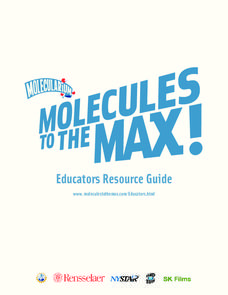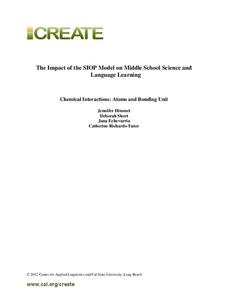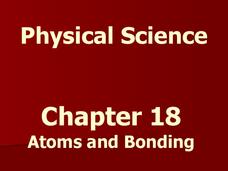Scholastic
Study Jams! Atoms: Protons, Neutrons, Electrons
What's smaller than a kiwi seed? Atoms! Basic atomic structure is detailed for beginning chemists in a light-hearted animation. Protons and neutrons are explained as part of the nucleus, and so are electrons that encircle the nucleus....
Teach Engineering
The Building Blocks of Matter
Everything can be reduced to atoms. The first installment of a six-part Mixtures and Solutions unit focuses on the building blocks of matter. Scholars review basic atomic structure, including protons, neutrons, and electrons, in...
Mr. E. Science
The Periodic Table
This science presentation focuses on the elements in the periodic table. It begins with the parts of an atom, explaining atomic mass and atomic number, valence electrons, and isotopes. Then it moves on to discuss various ways of...
Pearson
The Chemical Context of Life
An educational presentation includes atoms, molecules, the four major elements, as well as neutrons and protons. Additionally, slides focus on atomic number, mass number, atomic weight, polar and nonpolar covalent bonding, ionic...
Teach Engineering
Understanding Elements
Nothing says organization quite like a table. The third lesson in a six-part Mixtures and Solutions unit teaches young scientists about elements and the periodic table. They learn how the periodic table is organized and about the...
NASA
Atoms, Elements, and Isotopes
Rings and golden nuggets contain the element gold, but how small can you break it down before it is no longer considered gold? A helpful presentation explains the basics about atoms, elements, and isotopes through a presentation.
Massachusetts Institute of Technology
Nuclear Synthesis
Start this lesson with a bang! The eighth in a 13-part series of lessons explains the origin of elements beginning with the Big Bang Theory. The reading describes the formation of elements hydrogen through uranium.
Rensselaer Polytechnic Institute
Molecules to the Max!—Educators Resource Guide
From molecules to nanotubes, an engaging unit explores the world of tiny science. Fifteen hands-on experiments and lessons engage young scientists as they learn chemistry. Discussions, worksheets, and data analysis reinforce the concepts...
Center for Applied Linguistics
Chemical Interactions: Atoms and Bonding
Watch budding chemists interact with the resource on chemical interactions. In the unit, six lessons provide an overview of basic chemistry, from understanding the development of atomic theory to distinguishing between ionic and covalent...
Bowels Physics
Electrostatics
Explore behavior of particles that cannot be seen with a detailed PowerPoint presentation that outlines the basics of electrostatics. The presentation addresses the charge of subatomic particles, conductors and insulators,...
Mr. E. Science
Magnetism and Electromagnetism
The biggest magnet in the world is at the Los Alamos National Laboratory in New Mexico and can reach 100 tesla. By comparison, magnets that lift cars are about two tesla. The 11th presentation in this series covers magnetism,...
Mr. E. Science
Atoms and Bonding
I don't trust atoms because they make up everything. Budding scientists learn about famous scientists connected to atomic models, chemical, ionic, and hydrogen bonds. The presentation also presents how to count atoms...
National Energy Education Development Project
Introduction to Solar Energy
People have been using solar energy for many generations to dry crops, heat homes, and for light. This presentation explains how now it is possible to capture the solar energy and store it for future use, details how and where...
American Museum of Natural History
Light Quest
Grab a partner and shed some light on light. A remote learning resource has scholars play a board game to answer trivia questions about light. They also read about how Einstein contributed to the understanding of light as both a wave and...
Urbana School District
Forces
Is your class struggling with Newton's Second Law? Then show them a presentation that covers everything physics scholars need to know about forces. Starting with gravity, the slides focus on Newton's Laws of Motion, and end with an...
Biology Junction
Chemistry
You matter—unless you multiply yourself by the speed of light squared, then you energy! Scholars learn about matter, energy, the elements and so much more using an informative presentation. Completing the included worksheet creates a...















